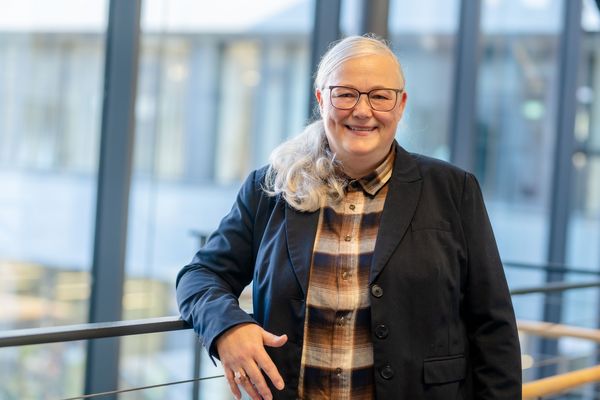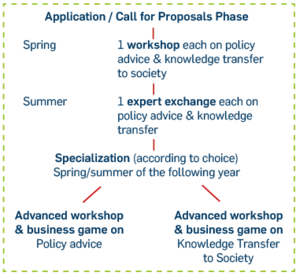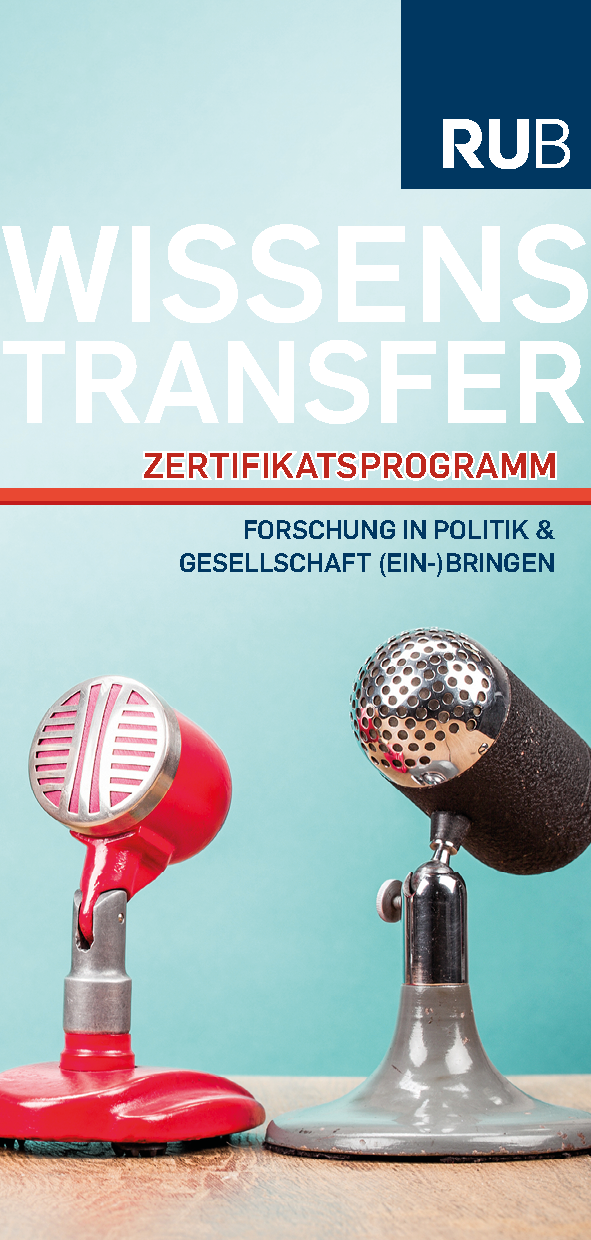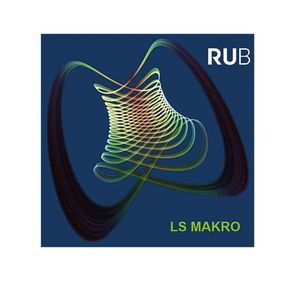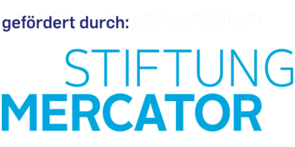- You are here:
- Startseite
- Doctoral Researchers
- Research Management Skills: Workshops & Events
- Science Communication & Knowledge Transfer
- Zertifikat Wissenstransfer
Bringing research into politics and society
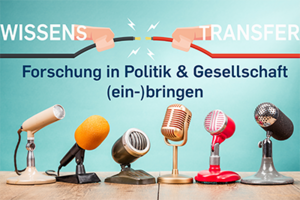
The certificate program provides basic expertise and initial professional skills for applying research knowledge in social and political contexts. Participants acquire professional skills for communicating specialized knowledge outside of research and gain initial practical experience through exchange with experts from science, politics, media and society.
The individual formats provide insights into attractive professional fields both inside and outside of research and teach how one's own expert knowledge can be applied in diverse, non-specialist contexts.
Bringing research into social and political fields of action and assuming responsibility there is an increasingly important responsibility of scientists inside and outside of research.
About the Qualification Program
2-year qualification program with basic and advanced modules to impart professional knowledge and skills in the fields of policy advice and knowledge transfer from research to society. The program is aimed at doctoral researchers from all research areas at UA Ruhr universities.
A certificate is issued for full participation in the program, documenting program duration, structure and content, as well as the qualification goals of the program.
Procedure of the Certificate Program
The certificate program is aimed at doctoral researchers from all research areas of the UA Ruhr universities Ruhr-Universität Bochum, University of Duisburg-Essen and TU Dortmund. The program runs for 2 years and combines basic and advanced modules with a total duration of 6 days, which are spread over the duration of the program. Participation in all modules is mandatory for obtaining the certificate.
All participants of the program take part in the basic modules and can then choose one of the advanced modules in order to profile their own qualification either in the field of "policy consulting" or "knowledge transfer to society".
Advanced Module on Policy Advice | Advanced Module Knowledge Transfer to Society |
| The focus on policy advice provides participants with basic knowledge and initial professional skills to make science-based facts, forecasts and alternative solutions at the interface between the political system and the scientific system usable for political discussions and decision-making processes. They learn how to make a fact-oriented, science-based contribution to solutions for concrete political issues and goals and how to make their scientific findings and expertise available to actors in political processes. | The advanced module Knowledge Transfer to Society teaches how research and scientific results can be communicated to the public. Participants learn how to present their research in a way that is understandable to non-scientific target groups and how to explain scientific content clearly. They acquire knowledge and first practical skills to communicate their research knowledge to non-scientific actors, discuss the role and responsibility of scientists in and for society and reflect on the societal implications of research for public opinion forming processes. |
The program integrates specially developed workshops that build professional competencies in the field of policy advice and knowledge transfer and combine them with an exchange of experience and knowledge with experts from the field as well as a business game as a practical transfer.
Past events
Kick-off event certificate program "Bringing science into politics and society", 18.02.2020
Experts:
Prof. Dr. Paula-Irene Villa Braslavsky (LMU Munich and Vice Chair of the German Sociological Association)
Jeannine Hausmann (Head of the Science Department of Stiftung Mercator)
Dr. Bernd Janson (Senior Consultant at ZENIT GmbH)
Franco Zotta (Office of Science Press Conference e.V.)
Panel discussion on the concerns, challenges, opportunities and experiences of successful science communication also against the background of the BMBF policy paper on science communication published in 2019.
Basic Workshop Policy Advice, 31.03. + 03.04.2020
Expert: Prof. Dr. Michael Roos, Chair of Macroeconomics Ruhr- Universität Bochum
The workshop introduced the basics of policy advice and presented functions as well as models of policy advice. The participants developed a current understanding of policy advice and science and discussed the role and responsibility of scientists. The workshop provided insights into the practice of policy advice and showed where and how policy advice by science takes place.
Basic workshop on knowledge transfer to society, 12.05. + 19.05.2020
Experts: Dr. Jan-Hendrik Kamlage and Dr. Julia Lena Reinermann, Kulturwissenschaftliches Institut, Essen, Germany
The workshop introduced the participants to the field of science communication with a special focus on communication and transfer of research knowledge from science to society. Concrete examples were used to show how science can be communicated to society and what demands are placed on scientists.
Advanced workshop "From the idea to the statement", 30.04.2020 with subsequent project phase
Experts:
Elmar König, Head of the Department Science - Politics - Society Leopoldina
Dr. Kathrin Happe, Leopoldina, Head of the Department of Science - Politics - Society, Leopoldina
In the advanced workshop, the participants were able to work with experts from the National Academy of Sciences Leopoldina. In the workshop, the working process "From Idea to Statement" of the Leopoldina, was replicated. In the workshop, which was followed by a work phase, the participants wrote a scientific statement on a current political topic according to the Leopoldina's guidelines and were able to exchange ideas with the experts about their work and their experience in scientific policy advice. The preparation of the statement was accompanied by the Leopoldina's business office.
Advanced workshop on Knowledge Transfer, 08.03.2021 with subsequent project phase
Expert: Kristin Raabe, science journalist
The workshop has conveyed which possibilities scientists can use to communicate their work publicly. The participants developed a communication strategy for the public communication of their research, defined goals and target groups, and profiled a core message. They also reflected on their own role and discussed the different communication channels for public communication of research.
Expert exchange on Policy Advice
Expert: Prof. Hermann-Josef Wagner, Chair of Energy Systems and Energy Economics at Ruhr-Universität Bochum, July 06, 2020.
Prof. Dr. Wagner participated intensively in the energy dialogue in Germany as chairman of the "VDI Energy Technology Division" and as chairman of the "VDI Energy and Environment Society". He also contributed to the expert report of the National Academy of Sciences Leopoldina on the possibilities of phasing out nuclear energy in Germany and thus accompanied the decisions of the German Bundestag.
Expert: Prof. Dr. Annekatrin Niebuhr, Chair of Empirical Labor Market Research and Spatial Econometrics at Christian-Albrechts-Universität zu Kiel and at the Institute for Employment Research of the German Federal Employment Agency, 09.07.2020
Prof. Dr. Niebuhr was a member of the "Commission for Growth, Structural Change and Employment" (abbreviated to "Coal Commission") set up by the German federal government to draw up recommendations on the coal phase-out and the associated structural change in the regions affected by it.
Expert exchange on Science Communication
Expert: Julia Weitemeier, Digital Editor at WDR's Science Editorial Office, 23.03.2021
Lisa Weitemeier provided insights into her work as a science journalist in the science editorial department of WDR. She explained how scientific topics are selected, how scientists are involved, but also how scientific topics are researched and prepared for contributions.
Expert: Prof. Dr. Denise Manahan-Vaughan, Head of the Department of Neurophysiology at RUB's Faculty of Medicine, 06.05.2021
Prof. Dr. Manahan-Vaughan has explained why she is committed to public communication of research, how she selects research topics for public communication, and how she makes research content and results understandable to a non-scientific public. She has explained who the public relations projects in her research reach, the possible expectations of publicly communicated research, and the reactions that can be expected.
Kick-off event of the certificate program "Bringing science into politics and society", 15.10.2020
Experts:
Prof. Dr. Uta Hohn, Vice-Rector of Ruhr-Universität Bochum and speaker of the competence field metropolitan research of the UA Ruhr
René Röspel, Member of the German Bundestag with a focus on research & innovation, among other things
Kristin Raabe, science journalist
Prof. Dr. Michael Roos, Chair of Macroeconomics at RUB
In a panel discussion, the experts discussed how scientists bring research knowledge into politics and society, what are suitable ways but also responsibilities of scientists in society and how scientific findings are used in politics and society.
Basic Workshop Policy Advice, 04.12. + 09.12.2020
Expert: Prof. Dr. Michael Roos, Chair of Macroeconomics of Ruhr- Universität Bochum
The workshop provided an introduction to the basics of policy advice, presenting both functions and models of policy advice. On this basis, the participants developed a current understanding of policy advice and science and discussed the role and responsibility of scientists. Finally, the workshop provided insights into the practice of policy advice and showed where and how policy advice by science takes place.
Basic Workshop on Knowledge Transfer to Society, 07.-08.06.2021
Experts:
Dr. Jan-Hendrik Kamlage, Head of the Research Group Participation and Transformation at the Center for Environmental Management, Resources and Energy (CURE) Ruhr-Universität Bochum
Dr. Julia Lena Reinermann, Department of Environmental Sciences FernUniversität Hagen
The workshop provided a basic introduction to knowledge transfer and participatory research. The aim of the workshop was to provide participants with possibilities, methods and central questions on how researchers can actively involve members of society in research and make their research useful for societal actors.
Expert Exchange on Policy Advice
Expert: Dr. Andrä Gärber, Friedrich-Ebert-Stiftung, Department of Economics, 29.03.2021
Dr. André Gärber conveyed how economic and social policy advice works and how policy advice functions in the day-to-day business of federal politics.
Expert: Prof. Dr. Thomas Clemen, University of Applied Sciences in Hamburg, 07.07.2021
Prof. Dr. Clemen advised the Federal Ministry of the Interior on civil defense and national security as a member of the Protection Commission until 2015. He discussed with the participants reasons, challenges but also possibilities of influence of scientists in policy advice and provided his own experiences in policy advice.
Expert exchange Knowledge transfer to society
Expert: Gregor Honsel, Editor for "Technology Review" magazine, 18.05.2021
Gregor Honsel has been an editor at Technology Review magazine since 2006. He shared with participants about his work at Technology Review and provided insight into how articles are created editorially. He explained how topics are selected and scientifically researched, in which contributions scientists are involved, but also how scientific topics are prepared for contributions.
Expert: Grit Kienzlen, responsible editor at Deutschlandfunk Nova for the "Grünstreifen" program, 24.06.2021
Grit Kinzlen talked to the participants about her work at DLF Nova and gave an insight into the editorial creation of contributions as well as editorial processes and decisions. She explained how topics are scientifically researched and prepared for contributions. She explained how and why scientists are included in contributions for a young audience, what role the "fit" of scientists plays for a certain target audience and what task science takes on in the contributions for this target group.
- Research related competencies: Workshops & Events
- Career Preparation: Workshops & Events
- Research Management Skills: Workshops & Events
- Full list of workshops & events
- Funding for Internationalization
- Advising & Ombudsperson
- Doctoral Database
- Welcome Hour
- Newsletter
Certificate program flyer
Your contact:
